
What is Compassion?
Compassion is about deeply understanding and caring for others who are facing adversity. It goes beyond just feeling empathy – it’s about genuinely wanting to help alleviate their suffering. When you’re compassionate, you actively show kindness and support to those in need. And this isn’t just beneficial for the recipients – it also fosters a sense of fulfillment and connection within yourself.
At its core, compassion is recognizing the humanity in others, acknowledging their struggles, and offering help without expecting anything in return. It doesn’t require grand gestures or drastic life changes; it’s often seen in small acts of kindness and understanding in everyday life. Whether it’s giving up your seat on the bus, being courteous to the cashier, helping a friend move, or simply lending an ear at work, these actions – no matter how small – contribute to creating a more compassionate world.

Understand some fundamentals about compassion like what it is and why we feel it.
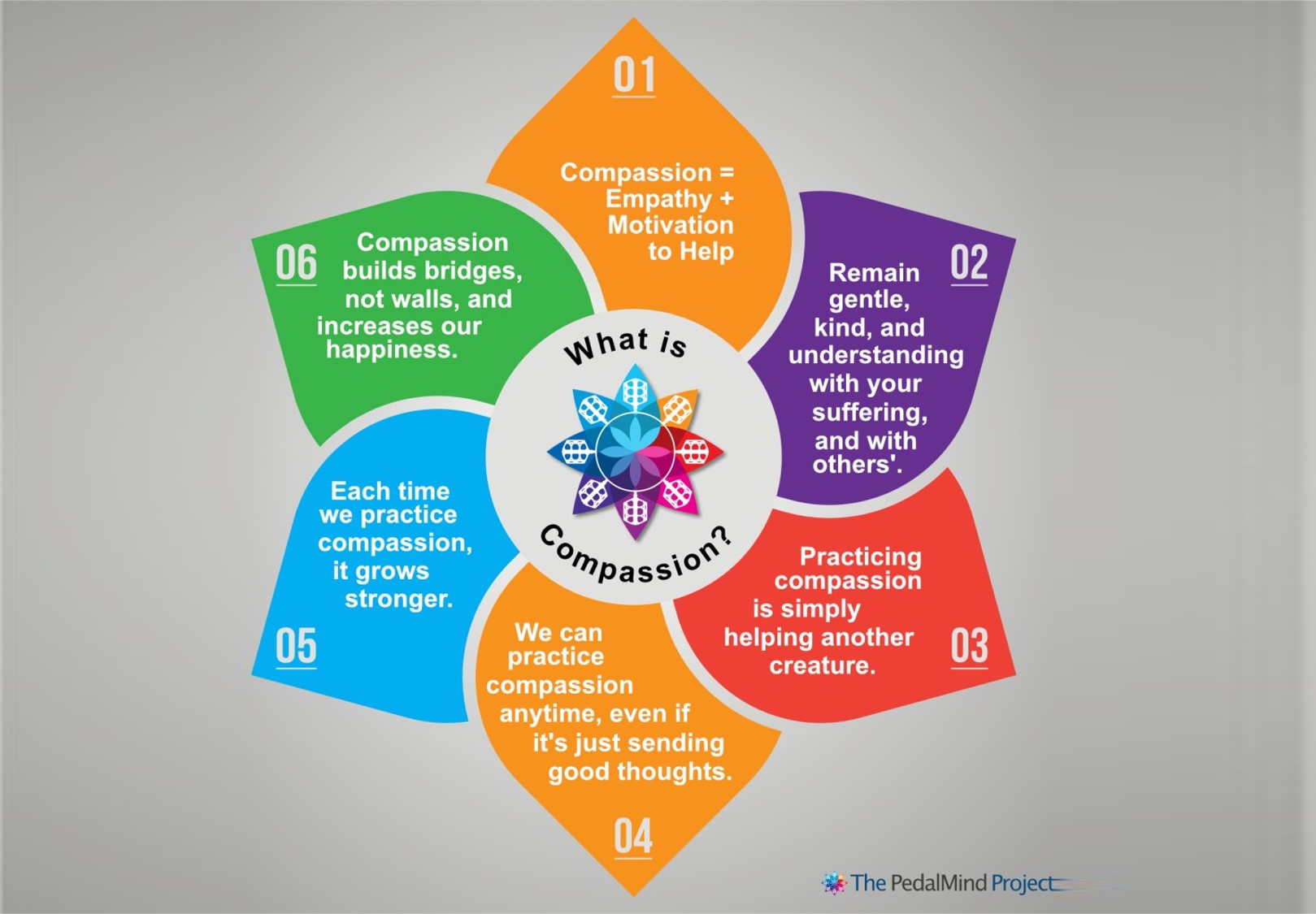
Six points that helps explain what compassion is and why it’s important.

Learn more about what compassion is, why to practice it, and how to cultivate it in our lives.
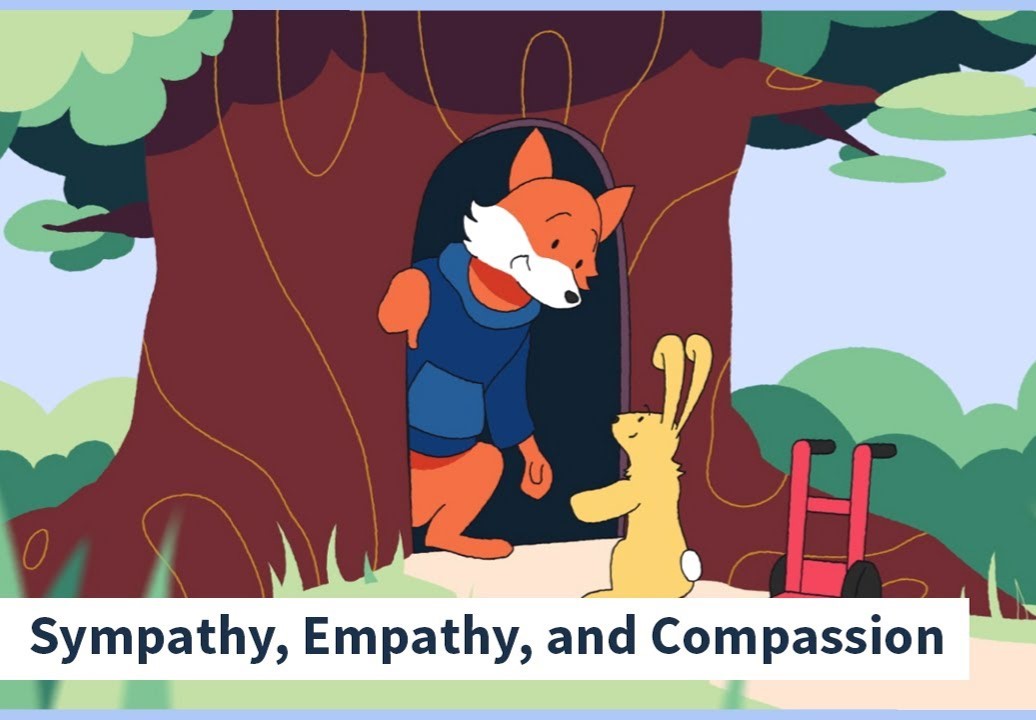
Sympathy, Empathy, and Compassion: How do they differ and which one do people prefer?
How Mindfulness Fits In
What is mindfulness?
Mindfulness is about being fully aware of our thoughts, feelings, and surroundings in the present moment with acceptance and without judgment. It means focusing on what’s happening right now rather than dwelling on the past or worrying about the future.
How does mindfulness relate to compassion?
Mindfulness lays the groundwork for compassion. If we’re not paying attention to what’s happening within and around us, we won’t notice suffering and be able to offer compassion in response. So, practicing mindfulness is a crucial first step in cultivating compassion.

There are many ways to incorporate mindfulness into your life. Here are some simple habits to consider.
Below are some suggestions of ways you can be more mindful each day.
Compassion for Family & Friends
Compassion towards our family and friends holds a special significance, as it underscores the importance of these cherished individuals in our lives. These are the people who hold a special place in our hearts, whose well-being matters deeply to us, and whose presence brings joy and meaning to our lives. Our connection with family and friends is rooted in care and affection. Therefore, showing compassion towards them is a natural extension of the love and concern we already feel, deepening the bonds that bind us together and enriching our relationships.
Compassion towards friends and family is important for fostering strong, healthy relationships and building a supportive network. It encourages open communication and understanding, creating an environment where individuals feel safe to express themselves honestly. Compassion also provides a foundation of support during challenging times, making it easier for loved ones to navigate difficulties together.
Things to Consider
- Boundaries: Respecting boundaries is crucial for maintaining healthy relationships. Being mindful of individual needs and preferences ensures that compassion is expressed in ways that are welcomed and appreciated by our loved ones.
- Balance: Consider your own needs and boundaries. This is essential to prevent burnout and maintain a healthy balance between caring for others and caring for yourself. Recognizing your limitations allows you to show up more authentically and sustainably in your relationships.
- Consistency: Consistency in practicing compassion is key to maintaining strong and resilient relationships, especially during times of conflict or disagreement. By demonstrating care and support consistently, we affirm our commitment to the well-being of our loved ones and reinforce the foundation of trust and understanding upon which our relationships are built.
- Authenticity: Be genuine in your expressions of compassion, which fosters trust and deepens mutual understanding. Avoid insincerity or overextending yourself out of obligation.

Being kind and compassionate is a good thing, but it’s also important to know the difference between “blind” compassion and “wise” compassion.

Betty Hart explains how compassion could save strained relationships, providing a chance for growth and change instead of losing important time with those we love.

Compassion fatigue: what is it and do you have it? A compelling talk by Juliette Watt explaining a syndrome that many of us experience when caring for loved ones.

When it comes to kindness, we are our children’s teachers. How to raise children who are compassionate towards others is worth consideration.

Relationships are important. Setting healthy boundaries within these relationships is equally important. Here are a few tips to keep in mind.
Here are some ideas for ways you can show compassion towards your family and friends:
Compassion for Co-Workers
Compassion in the workplace means genuinely caring about and understanding our colleagues. It goes beyond simply being polite or professional; it’s about actively trying to see things from their perspective, supporting them through tough times, and celebrating their successes.
Why Compassion in the Workplace is so Important
- Improved Relationships: Compassion fosters stronger bonds among co-workers. When people feel understood and supported, they are more likely to collaborate effectively, communicate openly, and resolve conflicts constructively. This leads to a more positive and productive work environment.
- Enhanced Well-being: Compassionate leaders and co-workers contribute to a workplace culture that prioritizes well-being. When employees feel cared for and valued, they experience lower levels of stress, anxiety, and burnout. This leads to higher job satisfaction and better mental health outcomes.
- Increased Motivation: Knowing that our colleagues have our best interests at heart motivates us to give our best effort. Feeling appreciated and supported fuels our drive to perform at our best and succeed.
- Boosted Innovation: A compassionate workplace encourages risk-taking and creativity. When employees feel safe to express themselves and share their ideas without fear of judgment, they are more likely to innovate and contribute to the organization’s success.
- Building Resilience: In challenging times, knowing we have the support of our colleagues and leaders helps us bounce back. Compassion fosters resilience and helps us navigate through tough situations.
Compassion in the workplace is not just a “nice-to-have” but a critical component of a healthy and thriving organizational culture. Organizations that prioritize compassion foster stronger teams and happier employees.

Understand the need and benefits of creating a compassionate workplace culture.

Entrepreneur James Rhee shares the value of investing in a culture of compassion at work.

Compassion in the workplace including its benefits, research findings, and what it looks like.
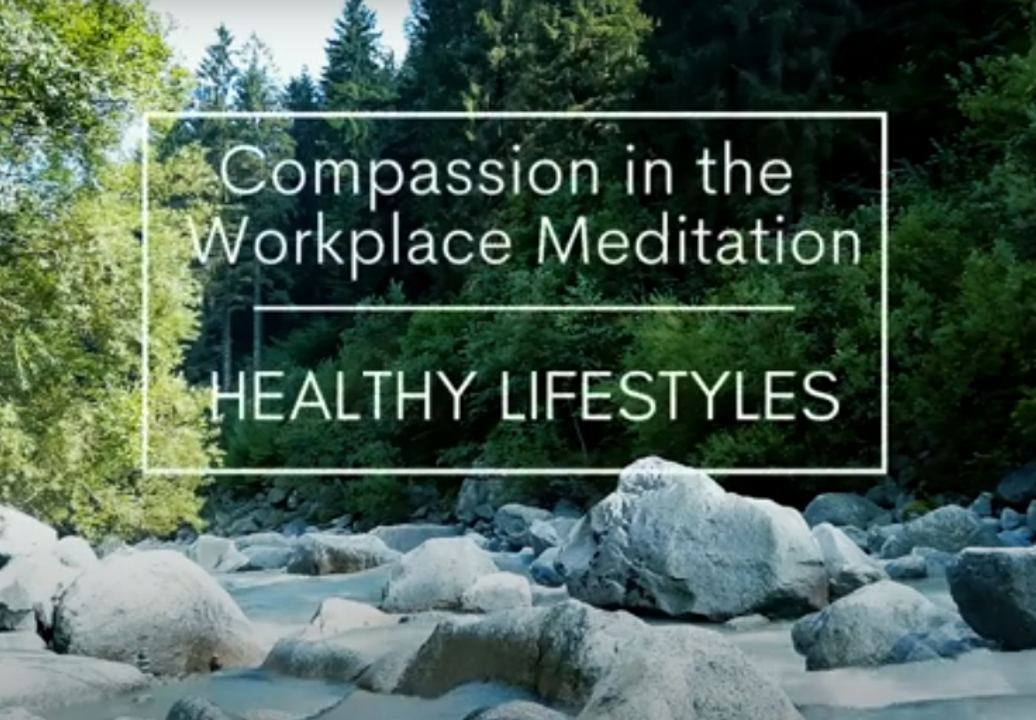
A guided meditation to help you develop deeper compassion for yourself and those you work with.

Our unconscious biases have a profound impact on our workplaces and coworkers. By better understanding these biases and actively addressing them, we can cultivate more compassionate work environments.
Here are some ideas for ways you can show compassion towards your co-workers:
Compassion for Community
Understanding the significance of showing compassion towards our friends, family, and colleagues may come more naturally since these are people we care about and interact with frequently. However, it’s equally important to broaden our compassionate attitude and recognize that everyone deserves our compassion and kindness. Despite our differences, in many ways, we are the same. We all want to be happy, loved, and appreciated. We all face struggles and challenges and can benefit from the support and kindness of others. By embracing this mindset, we not only make our communities stronger but also break down walls that divide us.
Expanding our compassion to include our planet is also important! Earth is our home, after all, providing us with everything we need to survive and the ability to interact and connect with nature can have a profound impact on our mood and overall happiness. Just like we care for our friends and family, we need to show some love to our environment. It’s not just about recycling or turning off lights; it’s about recognizing that every little action impacts the health of our planet. From the food we eat to the energy we use, it’s all connected. When we show compassion for the Earth, we’re not just doing it for ourselves but for future generations too. So, let’s treat our planet with the kindness and respect it deserves, making choices that ensure it stays beautiful and vibrant for years to come.

Compassion It founder, Sara Schairer, challenges us to ‘compassion it’ as often as we ‘google it.’

How to cultivate compassion for others even when it’s hard.
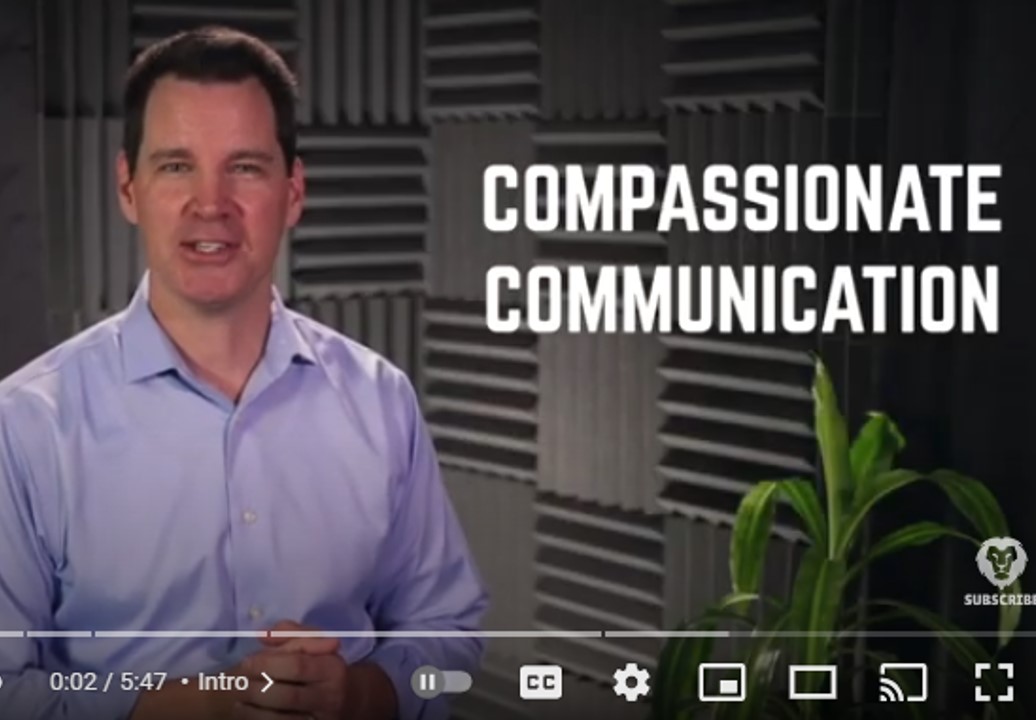
Three compassionate communication skills can transform your atmosphere.
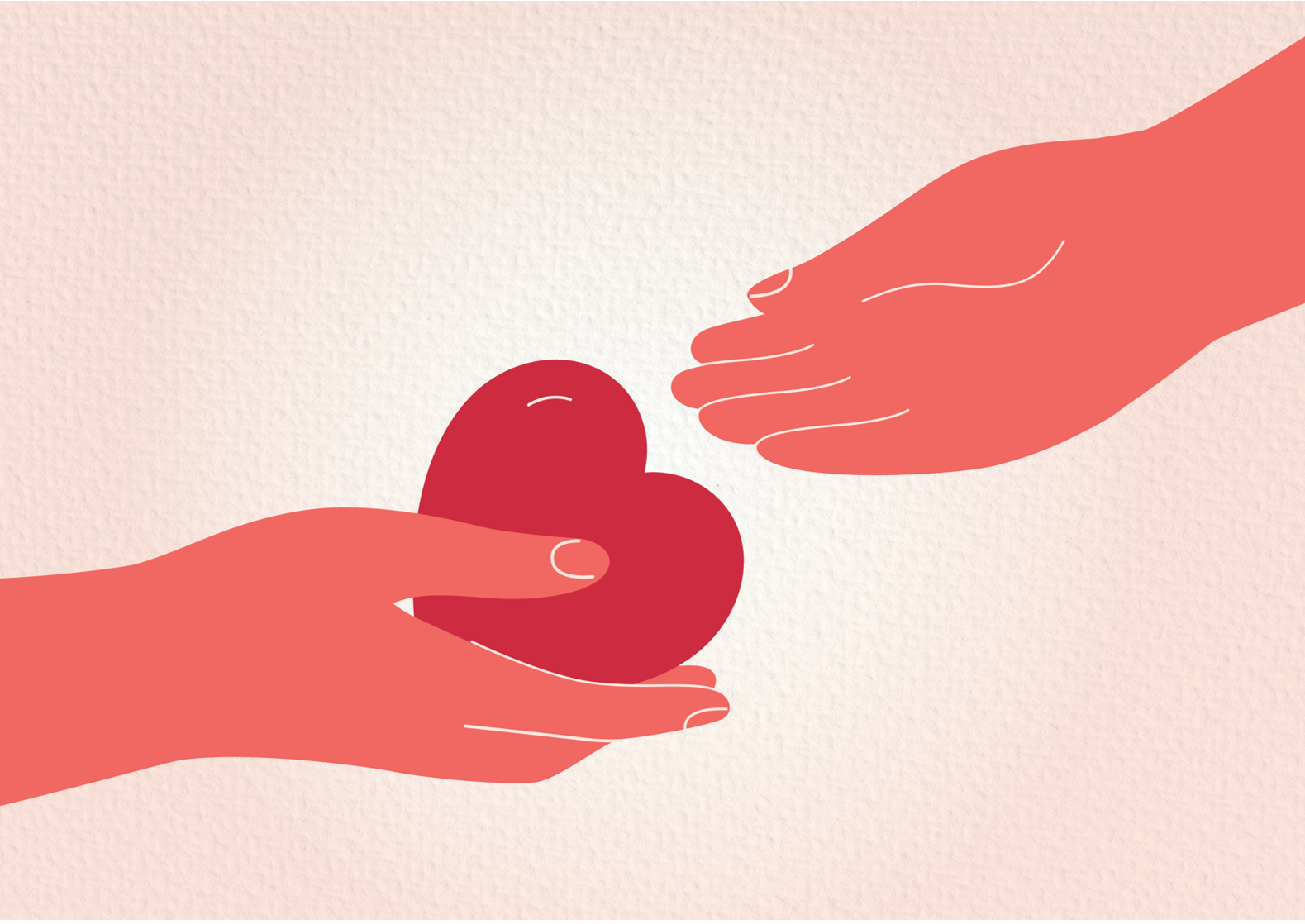
Understand how compassion disrupts our tendency to judge by recognizing our interconnectedness, generating a genuine desire to help.

Social connections are incredibly important to our mental well-being. Understand how to cultivate healthy relationships, fostering kindness and compassion to those around you.
Here are some ideas for ways you can show compassion towards your community and planet:
Compassion for Yourself
Compassion is often seen as something we extend to others, but it’s equally important to direct that compassion inwards, towards ourselves. Self-compassion involves treating ourselves with kindness when we encounter suffering, failure, or moments of inadequacy.
The practice of self-compassion yields numerous benefits for both mental and physical well-being. Those who embrace self-compassion recognize their own struggles and respond with gentle understanding, thereby alleviating anxiety. While some individuals seem to possess self-compassion effortlessly, for others, it requires deliberate cultivation. Fortunately, like any skill, self-compassion can be learned and honed over time.
Common Myths of Self-Compassion
Myth: Self-compassion makes us weak and vulnerable.
Truth: In reality, self-compassion serves as a source of inner strength, fostering courage and resilience in difficult time. Research consistently demonstrates that individuals practicing self-compassion exhibit a greater ability to navigate through life’s challenges, such as divorce, trauma, or chronic pain, with grace and determination.
Myth: Self-compassion is really just self-indulgence.
Truth: The opposite is actually true! Self-compassion embodies a commitment to long-term well-being, prioritizing health over momentary pleasure. Studies show that those who cultivate self-compassion are more likely to engage in healthy behaviours, such as regular exercise, mindful eating, moderated alcohol consumption, and proactive healthcare habits.
Myth: Self-compassion is making excuses for our bad behaviour.
Truth: In actuality, self-compassion fosters accountability and self-awareness, creating a safe space for acknowledging mistakes without resorting to external blame. Research indicates that individuals who practice self-compassion are more inclined to take personal responsibility for their actions and are willing to offer sincere apologies when their behaviour causes harm.
Myth: Self-criticism is an effective motivator.
Truth: Contrary to popular belief, self-criticism erodes self-confidence and fuels a fear of failure. Self-compassionate individuals maintain a strong drive to pursue their goals, not because they perceive themselves as lacking, but out of genuine self-care and a desire to fulfill their potential. They hold themselves to high standards while extending understanding and support in the face of setbacks.

Kristin Neff, the world’s leading researcher of self-compassion, explains the core features of self-compassion.

Learn the definition of self-compassion and how to practice it.

The RAIN of self-compassion. A meditation approach by psychologist, Tara Brach.

Understand where you are on the self-compassion scale and what you can do to become more compassionate to yourself.

There are many benefits to mental well-being connected to compassion – and some of the most compelling are linked to self-compassion.
Here are some ideas for ways you can show compassion towards yourself:






